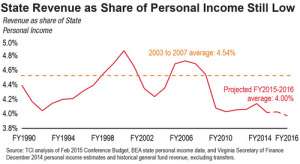 Originally posted by The Commonwealth Institute on March 12, 2015.
Originally posted by The Commonwealth Institute on March 12, 2015.
The Virginian-Pilot published an excellent editorial last week putting the seemingly rosy state budget news into sobering perspective. As it points out, the “improvements” that were made by the Virginia General Assembly this winter were only possible because of hundreds of millions of dollars in cuts to higher education, local governments, and state agencies over the prior nine months, a cut on top of years of cuts to services that were made during the Great Recession and which have never been restored.
This has done real harm. You can see it in Virginia’s K-12 schools, where the number of teachers has remained flat despite growing enrollment even as local governments are picking up a larger share of the costs of public education. You can see it in the tough choices facing college students and their parents as they grapple with a 32 percent increase in tuition since 2008, driven in part by a 25 percent drop in state support per student. And you can see it in the spending down of Virginia’s rainy day fund—$705 million of withdrawals compared to $373 million of deposits—despite the fact that the economy is expanding, not contracting.
Why is it that Virginia’s level of investment in its communities is far lower than before the recession—and far lower than what is needed to build a prosperous future for all Virginians—even as the economy recovers? General fund revenue—the money over which policymakers have the widest discretion—has failed to rebound at the robust pace that would be typical during a recovery.
Normally, income tax revenue, especially the tax on corporate profits, falls faster than the overall economy during recessions. Then, during recoveries, it increases faster than the overall economy.
But this time, overall tax revenue and income tax revenue is not increasing with the growth in the overall economy. General fund revenue as a share of total state personal income is at about the same level as during FY2010, the depth of the Great Recession, and is well below the levels that were typical during the economic expansion of the 1990s and mid-2000s.
If it were at mid-2000s levels, Virginia would have over $2 billion more per year to invest in our schools, colleges, and communities. Fixing this revenue problem and ensuring the state has adequate resources to invest in the future is critical.
Everyone likes being able to undo a little of the damage from the latest rounds of cuts this past summer and fall, and for Virginia’s policymakers it’s been warm smiles and glad handshakes all around for this year’s budget. But for the sake of Virginia’s families, schools, and communities, we need to remember that we haven’t gotten back to where we were even last year, not to mention before the years of cuts during the great recession.
There’s a lot of hard work ahead, and we hope that policymakers in Richmond will heed the critical points raised by the Virginian-Pilot and others around the state. Rose-colored glasses make for fun photo-ops, but not for responsible governing.




